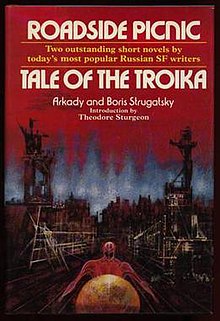- Joined
- Feb 26, 2008
- Messages
- 13,688
- Reaction score
- 10,817
I feel like the implication was the Zone affects all the Stalkers' kids, which would mean the second is closest to the truth. But maybe instead of radiation it's whatever mystical power that it is emanating.Stalker tells the Writer and the Professor that Stalker's never enter the room but we know that isn't always true because The Teacher A.K.A. Porcupine, went in the room and became wealthy but then hanged himself because his innermost desire was for wealth, not to save his brother who had died in the Zone. We also know that the Professor and the Writer had a conversation that Stalker's daughter was a "victim of the Zone" and had no legs.
I guess we can only draw from this a couple things.
1. Stalker might have gone in the room and his offspring was somehow effected.
2. Some sort of weapon or radiation caused a birth defect in Stalker's daughter.
3. Stalker's daughter has a problem with her legs but it is not related to the room, or radiation, or her father in any way and its just people's imaginations, rumor basically.
#2 and #3 seem unlikely to me because she moves shit with her mind. There is something going on with her more than just rumor and conjecture. So much so that the opening and closing scenes of the film are of moving glasses.
#1 is never revealed. Stalker never admits to going into the room.
This brings up a possibility #4. Stalker and his wife were at "ground zero", whatever that means, not necessarily nuclear, and the "event" caused their offspring to be a mutant. In other words, their house was in the neighborhood of "the room" when the event happened. I don't think we can ever know unless Tarkovsky reveals it in an interview somewhere.
I didn't think of that last option. it brings up the question, what makes a person a stalker? Maybe anyone who lived near the initial event was affected by the fallout and became uniquely qualified with powers of telekinesis and whatnot.
Weeeellll, of course I did?!?!Please tell me you did this on purpose.
You're forcing me to defend Fight Club philosophy? Is that what you're doing, you sadistic SOB? Ok, I'll give it a shot.But you know that that's idiot philosophy, right? You're free to do whatever you want whenever you want. That's part of the deal with free will: It's free. You don't have to lose everything to move to a different state/country or to quit your old job and start a new job. It's not conditional will, it's free will.
That's idiot philosophy talk that idiots puke up to delude themselves and anyone stupid enough to listen that they're deep.
Tyler's worldview, and the movie's message, is one of anti-consumerism. When he says "it's only when you give up everything that you can do anything", he's talking about the restrictions we place on ourselves by conforming to a materialistic society. "The things you own end up owning you", is a true statement. If you have no choice but to work your ass off to pay for all the shit you want but don't need, how free are you really?





